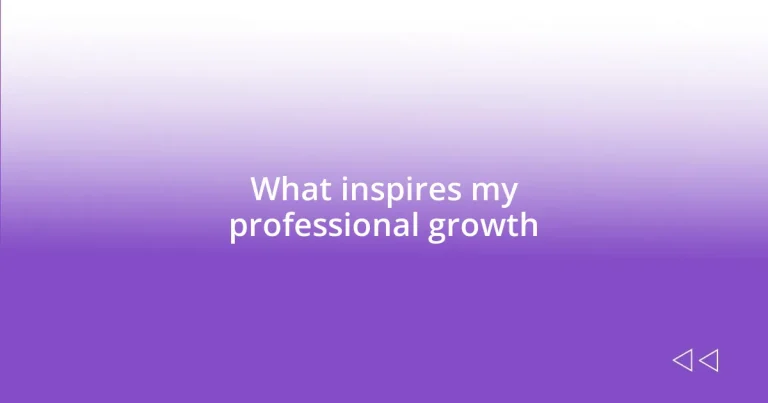Key takeaways:
- Inspiration can come unexpectedly from various sources and is crucial for transforming our perspective and motivations.
- Key factors in professional growth include mentorship, continuous learning, networking, receiving feedback, and effective goal setting.
- Continuous learning builds adaptability, confidence, and relevance in a fast-changing work environment.
- Networking fosters opportunities and strengthens career paths, while self-reflection on experiences promotes personal and professional growth.
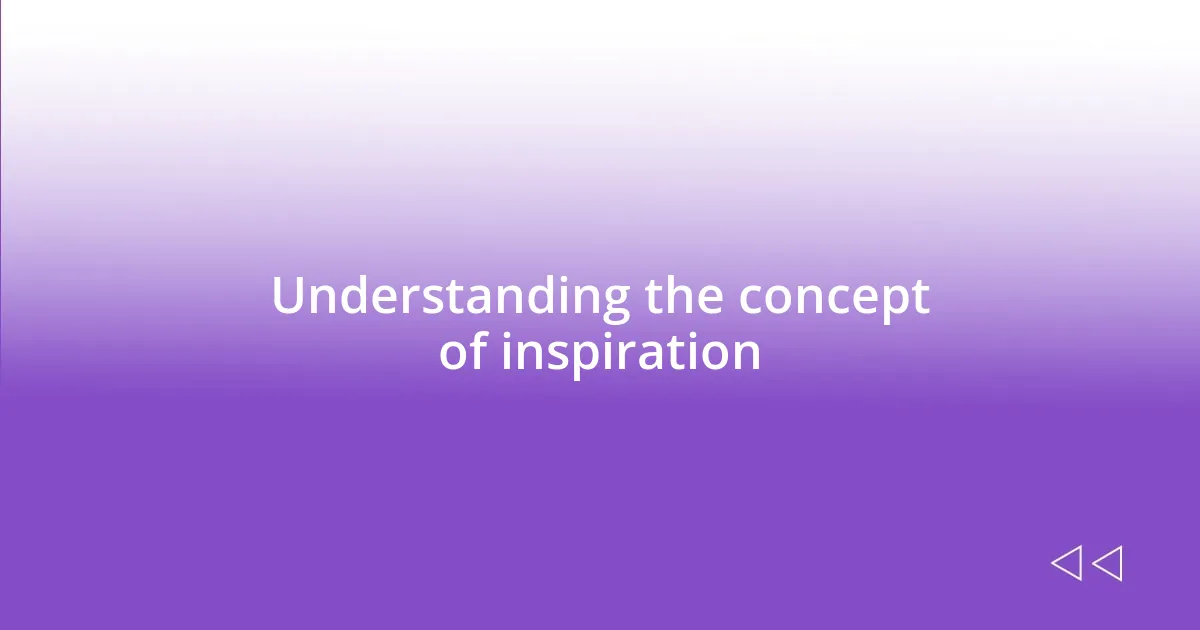
Understanding the concept of inspiration
Inspiration often strikes unexpectedly, like a spark igniting a fire within us. I remember sitting in a café one rainy afternoon, flipping through a book that seemed to resonate with my own struggles. It made me realize that inspiration can come from anywhere – a word, an image, or even a moment of silence. Have you ever had that one experience that shifted your entire perspective?
For me, inspiration is not just a fleeting feeling; it’s a profound connection to the world around us. I often find myself inspired by the stories of others who have overcome challenges. Listening to a friend share their journey of resilience left me feeling invigorated, as if my own dreams were suddenly within reach. Does it ever happen to you that someone else’s story lights a fire in your heart?
Understanding inspiration means recognizing it as a personal and unique experience. I’ve learned that it can also transform mundane tasks into something meaningful. Once, while working late on a project, I stumbled upon a TED Talk that reignited my passion for my work. It reminded me that inspiration isn’t just an epiphany; it can be the gentle nudge we need to keep moving forward. What about you—have you found ways to seek out inspiration in your daily routine?
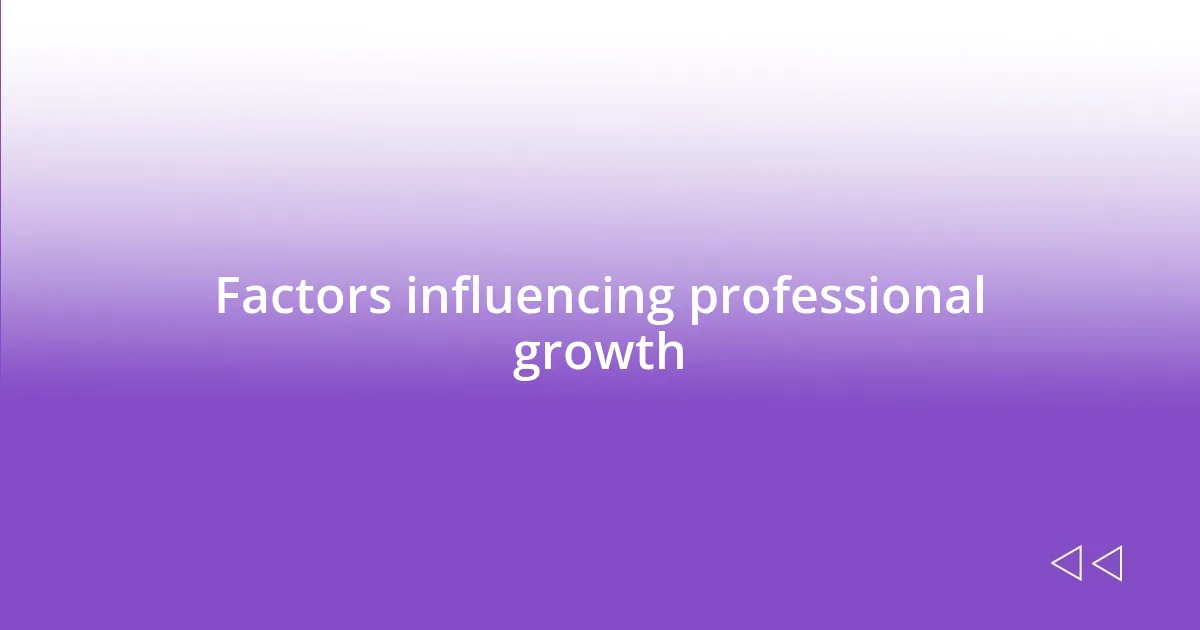
Factors influencing professional growth
Professional growth is influenced by a variety of factors, both internal and external. I’ve often found that my environment plays a crucial role in shaping my development. For example, when I switched to a more collaborative workplace, I noticed an immediate boost in my motivation. Engaging with others who shared a similar drive pushed me out of my comfort zone and encouraged me to take on new challenges.
Here are some key factors that can influence professional growth:
– Mentorship: Having a mentor who believes in your potential can be transformational. I recall how one mentor guided me through a complex project, offering invaluable perspectives that reshaped my approach.
– Continuous Learning: Committing to lifelong learning helps keep skills relevant. I remember enrolling in online courses that not only enhanced my expertise but also reignited my passion for my field.
– Networking: Building connections with professionals in your industry opens doors to new opportunities. One coffee chat led to a job offer I never saw coming.
– Feedback: Constructive feedback is essential for growth. I’ve learned to embrace criticism, as it often leads to newfound insights and improvements.
– Goal Setting: Setting clear, achievable goals helps map the path forward. I find that breaking larger ambitions into smaller steps makes the journey feel manageable and rewarding.
Each of these elements weaves together, influencing our paths and propelling us toward greater heights.
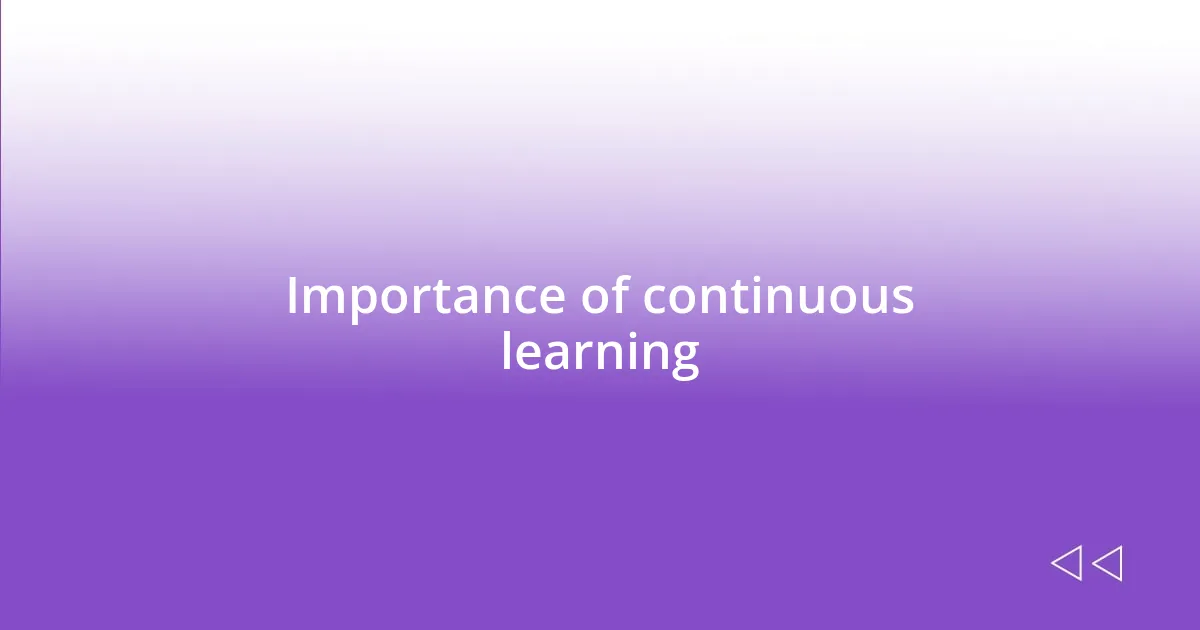
Importance of continuous learning
The journey of continuous learning is fundamental to professional growth. I vividly recall a time when I attended a workshop that opened my eyes to new industry trends. That experience not only equipped me with fresh skills but also sparked ideas I had never considered before. Have you ever had such a transformative moment that changed how you approach your work?
On a deeper level, continuous learning breeds adaptability. In today’s fast-paced world, the only constant is change. I remember a period when new technologies emerged that could have rendered my skills obsolete. However, by committing to learning through webinars and online courses, I not only maintained my relevance but also became a leader in navigating those changes. Isn’t it fascinating how embracing a mindset of lifelong learning can turn potential setbacks into opportunities for advancement?
Moreover, the act of learning itself cultivates confidence. I was once hesitant to present my ideas in meetings, fearing rejection. But over time, as I absorbed knowledge through reading and discussions, I began to find my voice. This newfound confidence helped me share my insights more freely. It makes me wonder—how has continuous learning impacted your confidence in your professional journey?
| Benefits of Continuous Learning | Examples from My Experience |
|---|---|
| Skill Enhancement | Attending workshops and online courses enhanced my expertise in emerging technologies. |
| Increased Adaptability | Learning about trends helped me remain relevant during industry shifts. |
| Boosted Confidence | Gaining knowledge allowed me to present ideas comfortably in meetings. |

Networking for career advancement
Establishing connections through networking significantly impacts career advancement. I once attended a local industry meet-up, where I struck up a conversation with someone from a company I admired. That casual chat not only broadened my professional network but also led to a collaborative project, ultimately opening doors I hadn’t imagined.
I’ve discovered that the strength of your network often correlates with the opportunities you encounter. I remember reaching out to a former colleague during a job transition. What began as a simple reconnection turned into a referral that landed me an interview for a position that perfectly matched my aspirations. Isn’t it incredible how one relationship can change the trajectory of your career?
Furthermore, I believe in the power of giving back within your network. I’ve made it a point to provide support to others, whether by sharing my expertise or simply listening. This reciprocity not only deepens relationships but also fosters an environment where everyone feels empowered to succeed. Have you experienced the fulfillment that comes from helping someone else on their journey? There’s something uniquely rewarding about contributing to others’ growth while nurturing your own.
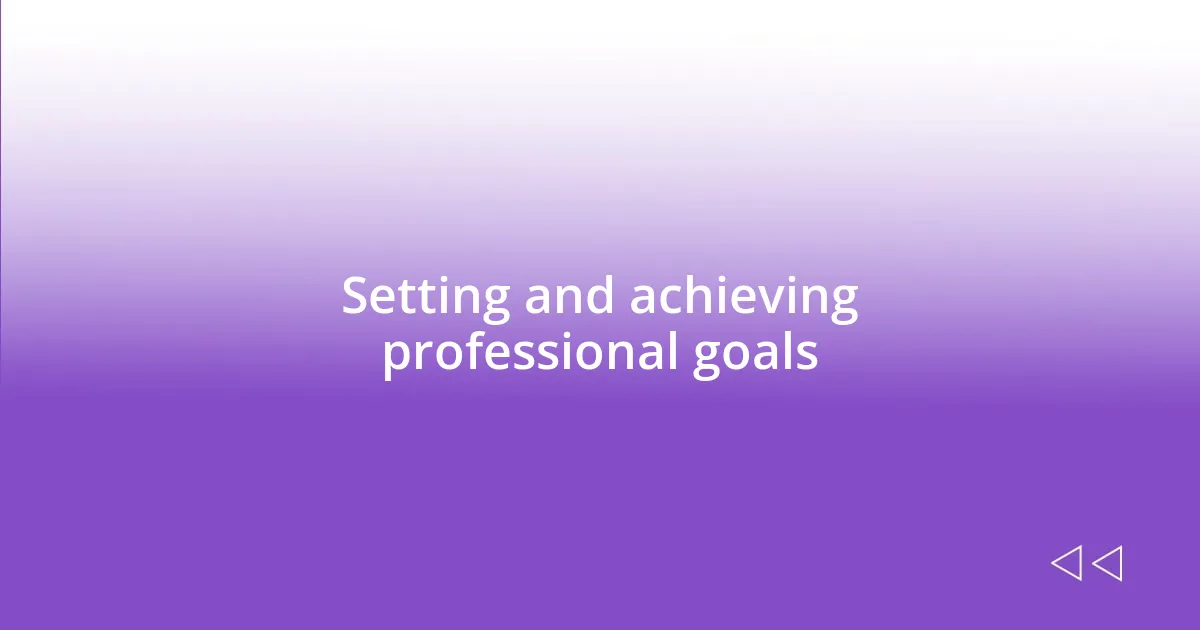
Setting and achieving professional goals
Setting realistic professional goals is crucial for creating a pathway to success. I remember setting a goal to enhance my public speaking skills, as I was often anxious about presenting in front of groups. By breaking this down into smaller milestones—like joining a local Toastmasters club and practicing my speeches with friends—I found a structured way to not only face my fears but also build my confidence over time. How do you prioritize the different aspects of your professional development?
Achieving these goals is not just about aimlessly checking off boxes; it’s about reflection and adjustment along the way. Once, I had a plan to complete a certification course within six months. However, life got busy, and I had to reassess my timeline. Instead of giving up, I adjusted my schedule, discovering that I could study during my commutes. It taught me that flexibility can turn obstacles into stepping stones. Have you ever had to pivot your approach to stay aligned with your goals?
Celebrating milestones, no matter how small, can be incredibly motivating. After completing that certification, I treated myself to a nice dinner, acknowledging the discipline it took to reach that point. I realized that these celebrations serve as reminders to keep pushing forward. What small wins in your professional journey have you paused to celebrate? These little victories can create a ripple effect that fuels future achievements.
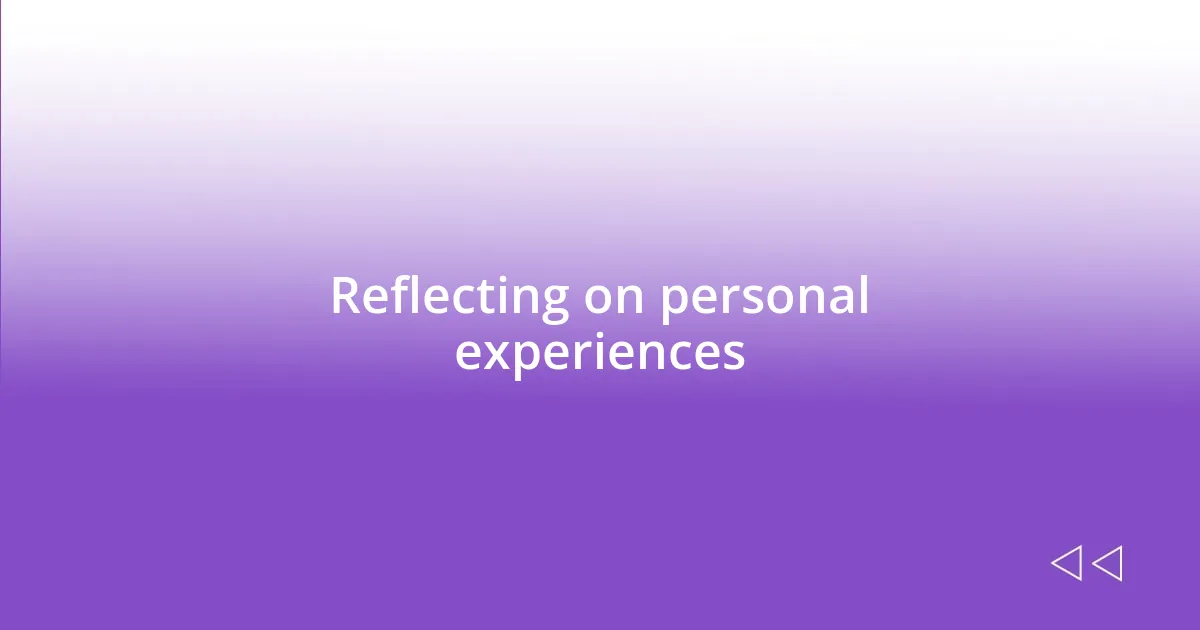
Reflecting on personal experiences
Reflecting on personal experiences has been a transformative part of my professional journey. I recall a time when I faced a significant setback after being passed over for a promotion I felt I truly deserved. Initially, that disappointment weighed heavily on me, but I took a step back and asked myself what I could learn from the situation. Through this reflection, I realized that I needed to seek more feedback and improve my visibility within the organization. Have you ever found growth hidden in a challenging moment?
I’m also reminded of a colleague who shared a personal story during a team meeting about overcoming self-doubt as a new manager. Her courage inspired me to examine my own fears and insecurities, prompting me to push beyond my comfort zone. This experience highlighted how our individual stories can illuminate different paths for each other. It’s fascinating how vulnerability can serve as a catalyst for growth. Have you experienced a moment where someone else’s honesty sparked a change in you?
Looking back on these moments, I see how they’ve shaped my approach to growth and learning. For instance, after a tough project that didn’t go as planned, I took the time to journal my feelings about it. Writing things down not only provided clarity but also marked a turning point in my professional mindset. I started viewing challenges as opportunities for development rather than failures. What strategies do you use to reflect on your own experiences? Engaging in this process has ultimately empowered me, reminding me that every experience—good or bad—carries a lesson worth exploring.












